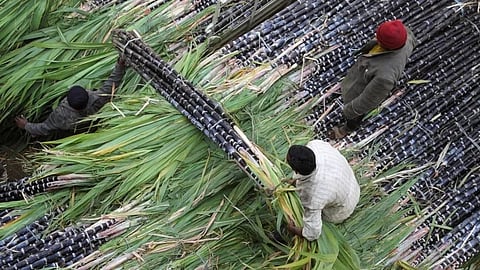
- NEWS
- the EDIT
- COMMENTARY
- BUSINESS
- LIFE
- SHOW
- ACTION
- GLOBAL GOALS
- SNAPS
- DYARYO TIRADA
- MORE

The Sugar Regulatory Administration (SRA) has imposed a moratorium on molasses imports to prioritize local production and support the domestic ethanol and alcohol industries.
The Department of Agriculture–attached agency said Thursday that, under Molasses Order No. 1 issued on 30 September, it would review import policies to better balance the needs of local producers and users.
Sugar stakeholders called for the moratorium after noting a decline in local molasses withdrawals from mills and a 30 percent drop in domestic prices, now averaging P12,000 per metric ton compared with P18,000 in the prior crop year.
Molasses is a dark syrup from sugarcane or sugar beets, used for animal feed, ethanol, and sweetening. Most local molasses goes to ethanol producers, helping oil companies meet the biofuel law’s requirement for locally made ethanol in gasoline.
Government data showed that molasses imports rose 28 percent last crop year to 853,285 metric tons, even as domestic production increased 20.5 percent to 1.176 million metric tons—over 200,000 metric tons more than the previous year. This has left millsite stockpiles of 303,961 metric tons by the end of August.
As such, SRA Administrator Pablo Luis Azcona said the agency will examine the “discrepancy” between local molasses production and alcohol output.
“We also need to see why the local molasses purchased from the farmers still remain unwithdrawn and unused. Hence, there is no need to import,” Azcona said.
“It is imperative that we know where these ethanol and alcohol producers are sourcing their molasses from.
For the ethanol producers, we hope that their feedstock is really local as the biofuel law states, and for the alcohol producers, that they consume the local produce first, which is actually of higher quality, prior to resorting to lower quality imported molasses,” he added.
According to the SRA, the moratorium will last until the end of the year but may be extended or lifted depending on stock levels.
The agency will no longer process “clearances for release of imported molasses,” although applications submitted before Molasses Order No. 1 and shipments already in transit are exempt.
Despite the moratorium, the SRA assured farmers and millers that a performance-based import allocation system will be developed to provide a fair approach to future molasses imports.
